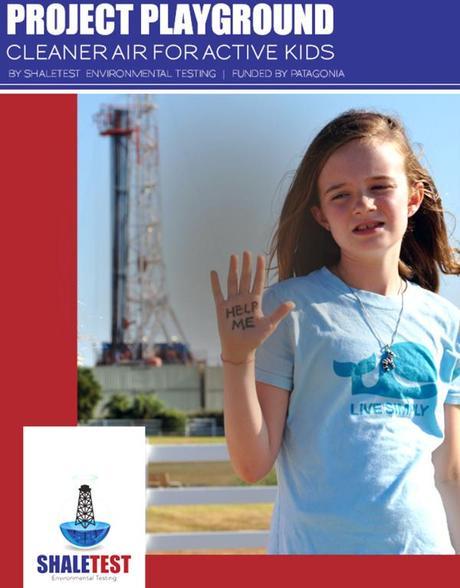by Anastasia Pantsios / EcoWatch

“The oil and gas industry claims that they’re drilling responsibly,” said ShaleTest president Tim Ruggiero. “These tests show they’re not.”
The story was featured on the cover of the alternative newsweekly Fort Worth Weekly this week under the headline “Bad Air Day.” It described a deserted Delga Park in Fort Worth next to a huge natural gas compressor station run by Chesapeake Energy, which reporter Peter Gorman had to leave after two hours because his eyes were tearing and he had difficulty breathing.
ShaleTest collected air samples at the locations and compared the results to the Texas Commission on Environmental Quality (TCEQ)’s Effects Screening Levels (ESL) and Air Monitoring Comparison Values (AMCV), “set to protect human health and welfare,” according to the TCEQ. The parks include two in Fort Worth, one in the Fort Worth/Dallas area suburb of Mansfield, the city of Denton and DISH in Denton County, whose story was told in Josh Fox’s Gasland films.
“The people living around Delga Park, in particular, are going to be sacrificed in the long term,” Calvin Tillman, former mayor of DISH and co-founder of ShaleTest, told Fort Worth Weekly. “And the sickening thing is that they’re being sacrificed so that the gas company can make a few bucks.”
The tests found benzene, a known carcinogen, at levels higher than the AMCVs and ESLs at three of the locations tested—seven times higher at Delga Park—as well as traces of two other carcinogens which can also cause skin and eye irritation, and impact the nervous system, liver and respiratory tract. It also found more than a dozen other chemicals linked to similar effects as well as dizziness, headaches, muscle weakness, low birth weight, learning disabilities, and toxic impacts to the kidneys, cardiovascular system and reproductive system.
The ShaleTest report warned that even if the chemicals found didn’t exceed the TCEQ exposure limits, those limits have been established for occupational exposures— adults whose exposure is around 40 hours a week— and that there hasn’t been much study done on the impact on children or those exposed all day, every day nor on the synergistic effects of combinations of the chemicals.
“There’s one woman [living across from Degla Park] who can’t hold down a job because she’s always sick, and none of the doctors she’s seen can explain why she has rashes and is constantly nauseated,” Ruggiero told Fort Worth Weekly. “Another woman has a child whose hair is falling out, and the doctors can’t give her any explanation about why that is happening. If people living near these gas facilities are all coming down with similar symptoms—rashes, nausea, eye problems, nerve issues—well, I think you ought to look to see if there is a connection between those facilities and those symptoms.”
“Chesapeake spokesman Gordon Pennoyer said he would look into the question of the company’s compressor station near Delga Park but had not provided any response by press time,” said the Fort Worth Weekly.
“The gas companies have told us since the beginning that the chemicals they’re spewing from wells, from fracking, from every facet of the industry do not exceed long-term danger levels,” said Tillman in the Fort Worth Weekly story. “But we’ve been into this for more than a decade now, and all the samples we took are right next to playgrounds. Maybe the levels we’re seeing—excluding benzene levels—won’t harm adults. But it’s our babies, our children who are exposed to these poisons, and we’re getting to a point where we will be seeing real and bad health effects. How can you put these levels of carcinogens in playgrounds and hope kids won’t be affected?”
With a contentious and expensive election coming up in November in Denton to consider whether to ban fracking there, ShaleTest said it would hold community meetings in the areas tested to share its results with the public and provide them with additional resources to identify health problems their families may be having as a result of the chemicals.
“We will also use these reports to gain the attention of the media, regulators and policymakers, increasing awareness of the impacts of shale oil and gas development near children,” said the report. “We aim to promote action and further investigation by the public health community.”
This article was posted with permission from EcoWatch

